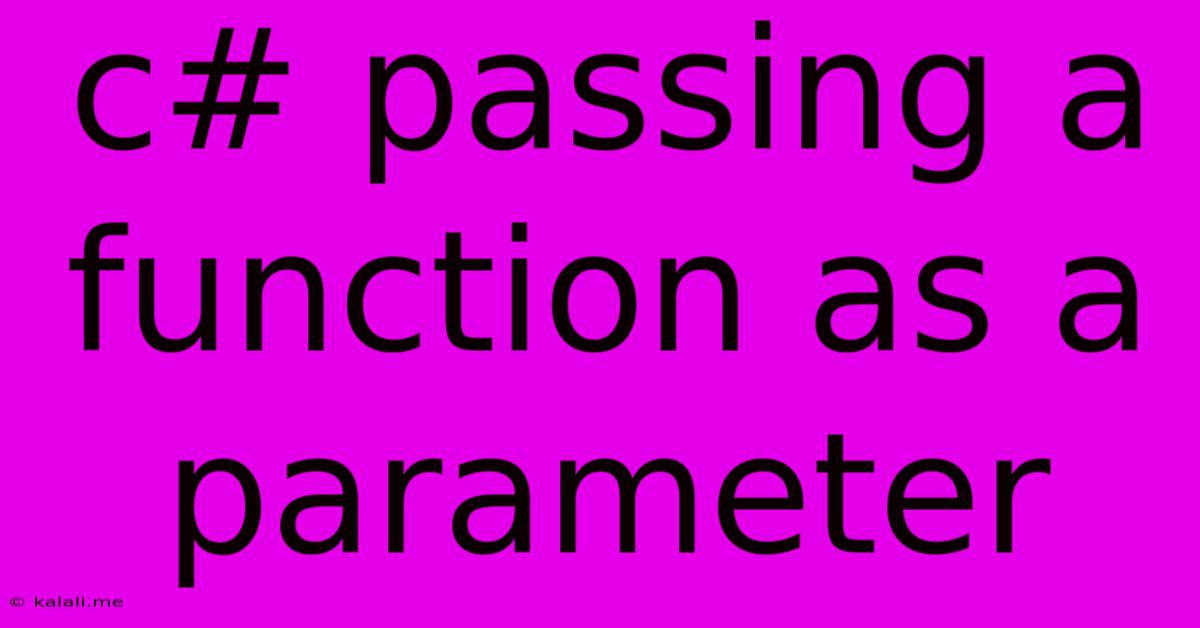C# Passing A Function As A Parameter
Kalali
Jun 07, 2025 · 3 min read

Table of Contents
C# Passing a Function as a Parameter: A Comprehensive Guide
Delegates and lambda expressions are powerful features in C# that allow you to pass methods as parameters to other methods. This technique, known as higher-order functions, enhances code reusability, flexibility, and readability, particularly when dealing with callbacks, event handling, and asynchronous operations. This article will explore the mechanics of passing functions as parameters in C#, covering delegates, lambda expressions, and practical examples.
What are Delegates?
In essence, a delegate is a type that represents a reference to a method. Think of it as a placeholder for a function. You declare a delegate type, specifying the return type and parameters of the methods it can hold. Then, you can create instances of the delegate and assign methods to them. This allows you to invoke the assigned method indirectly through the delegate instance.
// Declare a delegate type
public delegate int MathOperation(int a, int b);
// A method that performs addition
public static int Add(int a, int b) => a + b;
// A method that performs subtraction
public static int Subtract(int a, int b) => a - b;
public static void Main(string[] args)
{
// Create delegate instances
MathOperation addDelegate = Add;
MathOperation subtractDelegate = Subtract;
// Pass delegates as parameters
int sum = PerformOperation(addDelegate, 5, 3); // sum will be 8
int difference = PerformOperation(subtractDelegate, 5, 3); // difference will be 2
Console.WriteLine($"Sum: {sum}, Difference: {difference}");
}
// A method that accepts a delegate as a parameter
public static int PerformOperation(MathOperation operation, int a, int b)
{
return operation(a, b);
}
This example demonstrates how PerformOperation can utilize different mathematical functions (Add and Subtract) by accepting a MathOperation delegate as input. The flexibility provided by delegates allows for dynamic method selection at runtime.
Lambda Expressions: A Concise Alternative
Lambda expressions provide a more compact syntax for creating anonymous functions. They are particularly useful when you need to pass a simple function as a parameter without explicitly defining a named method.
public static int PerformOperation(Func operation, int a, int b)
{
return operation(a, b);
}
public static void Main(string[] args)
{
//Using Lambda Expression
int product = PerformOperation((x, y) => x * y, 5, 3); // product will be 15
Console.WriteLine($"Product: {product}");
//Another Lambda Expression Example
int result = PerformOperation((x,y) => {return x / y;}, 10,2);
Console.WriteLine($"Result: {result}");
}
Here, Func<int, int, int> is a built-in delegate type representing a function that takes two integers as input and returns an integer. The lambda expression (x, y) => x * y defines an anonymous function that multiplies its two arguments. This eliminates the need for creating a separate Multiply method.
Generic Delegates: Increased Versatility
C# provides generic delegates like Func<T, TResult> and Action<T>, which can handle various data types. Func represents functions with a return value, while Action represents void functions (no return value).
// Using Func
Func stringLength = s => s.Length;
int length = stringLength("Hello"); // length will be 5
// Using Action
Action printMessage = message => Console.WriteLine(message);
printMessage("Hello, world!");
Practical Applications
Passing functions as parameters is crucial in many scenarios:
- Event Handling: Event handlers are essentially methods passed to event-raising objects.
- LINQ (Language Integrated Query): LINQ extensively uses delegates for querying data. Methods like
Where,Select, andOrderByaccept functions as predicates or transformations. - Asynchronous Programming: Callbacks and continuations in asynchronous operations often involve passing functions to be executed upon completion or failure.
- Customizable Algorithms: Algorithms can be made more flexible by allowing users to specify custom comparison functions or evaluation criteria.
Conclusion
Mastering the art of passing functions as parameters in C# unlocks significant potential for creating more dynamic, reusable, and efficient code. By understanding delegates, lambda expressions, and generic delegates, developers can harness the power of higher-order functions to solve a wide array of programming challenges. This ability is essential for creating sophisticated and maintainable C# applications.
Latest Posts
Latest Posts
-
Can You Replace A 2025 Battery With A 2032 Battery
Jun 07, 2025
-
What Does Quran Say About Jesus
Jun 07, 2025
-
Vscode Terminal Send Sequence Delete All Left Cusror
Jun 07, 2025
-
Sounds That Dont Exist In Russian
Jun 07, 2025
-
Espresso Coffee In A French Press
Jun 07, 2025
Related Post
Thank you for visiting our website which covers about C# Passing A Function As A Parameter . We hope the information provided has been useful to you. Feel free to contact us if you have any questions or need further assistance. See you next time and don't miss to bookmark.